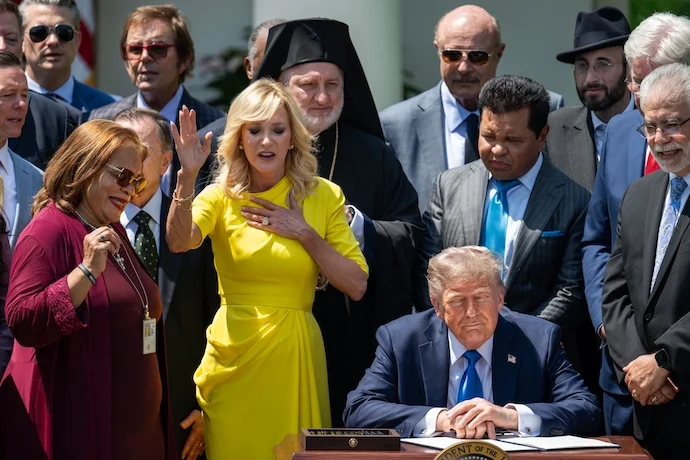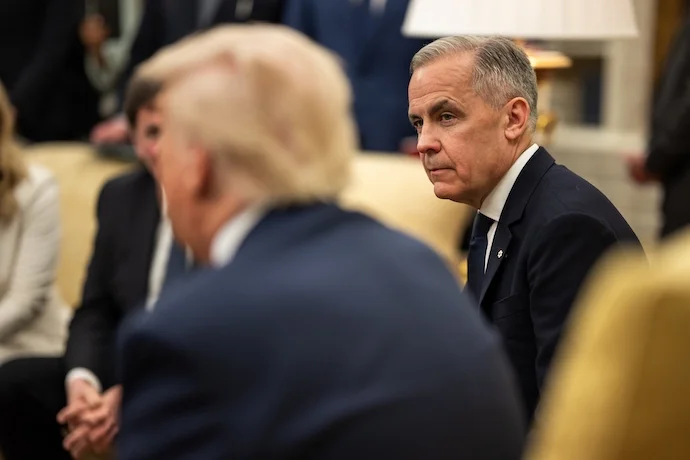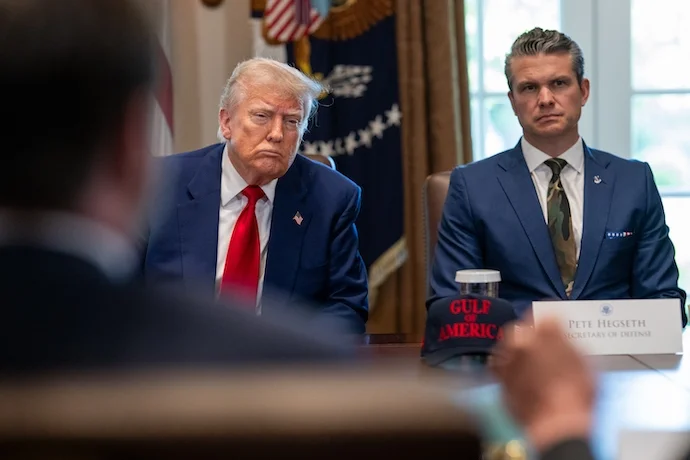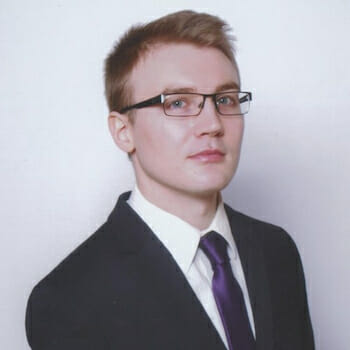
Politics
America’s Regress: Kristen Monroe on Trump, Misogyny, and Moral Collapse
In this wide-ranging conversation, political scientist Kristen Renwick Monroe examines the erosion of democratic norms in the United States during the Trump era, the surge in authoritarian tendencies, and the intensifying cultural backlash against marginalized communities—particularly immigrants, women, and transgender individuals. A Chancellor’s Professor of Political Science at the University of California, Irvine, Monroe is a leading scholar in political psychology, ethics, and moral choice. She is also the founder and director of the Interdisciplinary Center for the Scientific Study of Ethics and Morality.
Educated at Smith College and the University of Chicago, Monroe has devoted her career to investigating the moral foundations of political behavior. Her acclaimed books—The Heart of Altruism, The Hand of Compassion, and Ethics in an Age of Terror and Genocide—explore how identity shapes altruism, moral courage, and even complicity in genocide. She has received numerous accolades, including the Nevitt Sanford Award from the International Society of Political Psychology and the Harold Lasswell Award from the American Political Science Association for lifetime achievement.
Monroe critiques Trump’s disregard for constitutional principles and his polarizing leadership style, stressing the need for empathy, institutional integrity, and shared human values. She speaks passionately about the importance of gender equality and the urgency of placing more women in positions of power, drawing favorable comparisons to the inclusive political systems of countries like Finland and Sweden.
Through personal anecdotes and sharp analysis, Monroe warns of a growing tide of xenophobia and legal manipulation by Trump’s allies. Though she hopes to see a woman elected president, she argues that ethical leadership and sound policy must come first. The conversation ends on a hopeful note—with a call for unity and recognizing the common humanity that should bind Americans together, not drive them apart.

Scott Douglas Jacobsen: Let’s start big. What is your sense of the first 100 days of the second Trump administration?
Kristen Renwick Monroe: The journalist fact-checkers are going wild with Trump before we start.
Let me tell you the joke about Trump dying and going to heaven. He sees all these clocks and asks, “What is the deal with the clocks?” They reply, “Everyone has a clock. That one is George Washington’s. He never told a lie, so the hands never moved. Every time someone tells a lie, their clock moves one minute.” Trump points to another and says, “Well, that one’s only moved twice.” “That is Abraham Lincoln’s clock,” they say. “He only told two lies.” Trump then asks, “Where is my clock?” “Oh, Saint Peter’s using it as a fan,” they reply.
A homemade sign can best capture the first 100 days. I saw one in a neighbor’s window during a walk one day. It read, “OMG GOP WTF.” People have used that expression so much now.
I never used to say “WTF,” but I have started saying “ED”—for “expletive deleted”—because, frankly, Trump has flooded the zone with executive orders and policies that attack virtually everything I have cared about my entire life.
He has targeted civil rights and human rights. His economic policies make no sense at all. I completed two postdoctoral fellowships and was one of the few Americans to be a Killam Fellow at the University of British Columbia, specializing in political economy. These policies are starting to do the damage we feared they would.
He has cut off portions of foreign aid and treated foreign leaders with great disrespect. His treatment of President Volodymyr Zelensky during his first term—pressuring him to announce an investigation into a political opponent—was outrageous. His treatment of Prime Minister Justin Trudeau was deeply undiplomatic and embarrassing.
As an American, I am embarrassed to have him as president. I am upset about it, and so is everyone I know. I do not believe he understands the full consequences of his actions.
As a political psychologist, I know there is a good movie out called Unfit. It was made during Trump’s first term by psychoanalysts, mostly professionals trained to assess individuals’ psychological fitness. They argued that he was not fit to govern from a psychological standpoint. He is undoubtedly a narcissist, a bully, and an extortionist. I do not think he understands how much he is hurting many people.
Moreover, as David Brooks has said, that is part of the point. He is a narcissist who needs power, and to have power, you have to show that you can hurt people. He seems to take great pleasure in doing that. That is what is so troubling.
Regarding the United States’ global standing, I don’t blame other countries for not trusting us in the future. He has done irreparable harm to America’s reputation in the international community and significant damage to democratic institutions at home.
I am currently working on a book examining how he has harmed institutions. However, fundamentally, he is authoritarian by nature. He aspires to be a despot. He admires people like that. Yes, he has done a few things that have had some positive impact, but overall, I agree with what Jimmy Kimmel said: his grade would be somewhere between an “F” and a “U.”

Jacobsen: On the psychoanalytic aspect, there are also elements of Cluster B personality disorders beyond narcissism. One key trait among several of those disorders is a lack of remorse. Was there any commentary around that part of the human personality about Trump?
Monroe: Yes—lack of empathy. You need empathy to experience remorse. Moreover, I do not think he has any. That is, in fact, part of the definition of a sociopath.
Now, these definitions—according to the DSM—vary. They shift depending on revisions and diagnostic criteria, whether you are talking about a sociopath or a psychopath. However, Trump does not appear to have empathy for anyone. I do not think he has what we would consider a conscience. I do not believe he regrets anything.
His contact with reality is tenuous. I do not think he even understands the things he says. He makes statements that are so strange that people are left wondering, “What are you talking about?” They will show footage from the first day of his administration—there are pictures of the inauguration crowd. He sent Sean Spicer to say the photos were doctored and that his crowd was bigger than Obama’s. However, the photographs clearly show that it is not true. So he says demonstrably false things.
He is claimed to be the best president since Lincoln, possibly the best president ever. He has even compared himself to Christ. If you listen to him, you think, “What are you talking about?” He said, “Canada wants to become the 51st state.” Where does he get these ideas?
He makes things up, like the idea that Greenland will become part of the United States or that we’re renaming the Gulf of Mexico the “Gulf of America.” I do not know where he gets these things; they seem to pop into his head. So, no. He has shown no remorse for anything he has ever done.
Jacobsen: And what about the lack of empathy, especially in how he treats people, particularly women?
Monroe: I thought about that, especially since you mentioned you wanted to discuss women. I would say he is an all-purpose abuser. It is not just women. I am not sure Trump singles women out more than anyone else—he tends to go after everyone. However, does he treat the women in his life well? No. The stories we read do not suggest that. For example, burying his ex-wife Ivana on a golf course—that seems odd and in poor taste.
There is such a profound disconnect. People of good taste, with any empathy or concern for others, would not do the things he has done. It is hard even to know where to begin.
His relationship with Melania, for instance, appears transactional. I saw an interview in which she was asked, “Would you have married him if he were not rich?” and replied, “Would he have married me if I were not beautiful?”
At first, when Melania did not immediately move to Washington after the inauguration, the public story was that she wanted her son Barron to finish school. That seemed thoughtful until it came out that she was renegotiating the prenuptial agreement. She knew she had leverage, and she wanted more money. The one consistent thing about Trump is his obsession with money and power.
Just the other day, a significant article appeared in the upper right-hand corner of the front page of The New York Times about how his children are profiting financially from his political position through his companies on a scale we have never seen before. No other U.S. president has owned golf courses and hotels where government officials and diplomats would stay, often at taxpayer expense.
There is a story from when one of his sons—Eric, I believe—was in college. They wanted to host a small golf tournament to raise money for a children’s cancer charity. They asked to use one of Trump’s golf courses. He agreed but charged them full price, like any other client. He did not offer a charitable discount.
As the tournament became successful, he raised the fees. Then, he required that they put a couple of his people on the charity’s board. Eventually, he took over the whole operation. Even if politicians are venal or corrupt, they usually have a soft spot for their children. They may do questionable things to benefit them, but it is not just favouritism in Trump’s case. It is empire-building through his family.
Biden may have had a little of that, yes. However, in retrospect, I cannot blame Biden for pardoning Hunter—if that even happens—because the kinds of things Hunter has been accused of are minor compared to what Trump has done.
It is like what Everett Dirksen, the Senate Minority Leader from Illinois in the 1950s and 60s, reportedly said: “That gives hypocrisy a bad name.” Trump has done egregious things, and he has used his children to enrich himself. They have all made fortunes, and he is making a fortune, too.
Now we see things like “Trump coins,” photoshopped images of him as the Pope. He has even talked about wanting to be like the Pope. You begin to question his grasp on reality seriously. However, the most disturbing thing about Trump, for me, is how many people voted for him.
Including people close to you, including one of my sons. He is a Bernie supporter. He hated what the Democratic Party did, thinking they failed the working class. Moreover, I cannot argue too much with that criticism. However, why would you vote for Trump? I also have a few good friends—dear people—who voted for Trump. After Trump was in office, I asked one of them, “Are you upset?” He said, “No. At least he is doing something.”
I do not know what to say to people like that. There is also the husband of a good friend I have known since I was 12. She is religious. She supported Trump because of abortion. Moreover, I thought—what is that doing? I remember speaking to her husband after the immigrant children were put in cages. I asked, “How can you support someone who does something like that?” Moreover, he said, “Well, the stock market’s doing great.”
Again, I did not know what to say. Is that what matters most? As long as your investments are up? However, now Trump is hurting the stock market, too. Moreover, so many people I know…it will get worse. However, he has already done enormous harm to the United States’ image and its democratic institutions.
There is just so much damage. However, two significant factors are at play: one, the United States’ standing in the international community, and two, the rise of rival powers, especially China.

Jacobsen: Let’s begin with the broader international landscape, and we can turn to China as a secondary focus. After World War II, the United States played a central role in creating and leading many of the global institutions we still depend on—what we now refer to as the “rules-based international order.” That framework has been under strain for some time, but Trump’s presidency markedly accelerated its destabilization. He undermined alliances, withdrew from foundational agreements, and treated long-standing partners with open contempt.
This morning, I rewatched a lecture from around 2015, delivered shortly after the death of Lee Kuan Yew, Singapore’s founding Prime Minister. The speaker made a pointed observation: while the United States has unquestionably contributed to global progress and institution-building, it also inflicts significant harm when it turns against those same institutions. He phrased it diplomatically, but the message was unmistakable.
At that point, the U.S. had been the principal architect of global governance for nearly seven decades. Now, almost ten years on, it feels as though we’re witnessing a full-scale assault on that legacy—particularly on America’s international standing and its symbolic role in promoting democracy and the rule of law through global institutions. How do you interpret this shift?
Monroe: We started building the international order after World War I when it became clear that we live in a globalized world. You cannot isolate yourself. What happens in one country inevitably affects others. That realization led to the creation of various international organizations.
The League of Nations was an early attempt, but it lacked the enforcement power to prevent another catastrophic war. After World War II, we saw a much stronger push. Institutions like the Bretton Woods system, the International Monetary Fund, and the World Bank were all part of that framework.
At that time, the U.S., Canada, and parts of Latin America were largely untouched by the devastation of the war. The United States emerged as a significant global power, and with that power came the capacity and responsibility to shape the world for the better. If you want to be the most crucial country in the world, you must behave accordingly.
Beyond geopolitics, there is also the international economic system. We live in a globally interconnected marketplace—I am wearing a sweater that was probably made in China. You likely own things made in China. I remember when I was in graduate school, I was upset about child labor and exploitative conditions in places like China. However, living standards have increased in those countries, and there are temporary dislocations.
We benefit by getting affordable goods, and they benefit through rising wages and economic development. So, things do improve over time, even if unevenly. Now, I am not arguing that capitalism is inherently humane. It is not. However, it is more efficient than communism. Central planning does not work well—it is tough to coordinate an entire economy from the top down.
In addition to the economic systems, you also have essential developments in international law and human rights organizations. I have served as President of the Human Rights Section of the American Political Science Association, and I can tell you that these issues get complicated very quickly.
I recall a case—I believe it was in Peru—where the section was lobbying for labour reform. It had to do with child labour. Children under 16 worked longer hours than legally allowed in the U.S. However, the people on the ground said, “Don’t interfere. Do not try to change this from the outside.” Why? Because for them, even those problematic jobs were better than the alternative: extreme poverty or no income. These dilemmas clarify that global governance, human rights, and labour practices are deeply interconnected and require nuanced, culturally informed solutions.
In Peru, they told us, “If you are 14, you are pretty much an adult. You have to take care of yourself. If you make it impossible for us to work at 14, we are going to starve. Our families will starve. Girls will turn to prostitution.” People are desperate for money. So, it gets complicated. However, the world is interconnected—you cannot ignore that. Moreover, that is one of the things Trump has tried to ignore or actively undo. Take the issue of tariffs. Tariffs do not work—not the way they are being used now.
Historically, we used tariffs when the U.S. had no income tax. However, that was before the modern tax system. Some states, like Florida, do not have a state income tax. They rely heavily on tourism for revenue, and that works for them. However, most other states require an income tax to function correctly.
The broader idea of shrinking government sounds appealing to some people, but you must ask: “What does government do?” It is a tool. Like a hammer, it can smash a window or build a house. Government is neither inherently good nor bad—it depends on how it is used.
Trump and many people in the 2025 conservative movement seem to treat the government as inherently evil. However, that is just not true. Without government, you lose social services and the safety net. Look at places like Scandinavia—Finland, for example. Some people cite Indonesia as a happy country, though I do not quite see that. However, Finland consistently ranks among the happiest nations on Earth.
Why? Because they have a robust social safety net. If you get into a university in Sweden, even if you are from Canada, it is paid for. No tuition. No massive student debt. You will have healthcare, public housing, and pensions when you grow old. Yes, taxes are high. I have been to Finland and Sweden. Things are expensive. I remember giving a talk there—I had come from Southern California and forgot my gloves. I went out to buy a pair and saw beautiful leather gloves. I looked at the price: $200. I thought, “That’s not for me.” It was the luxury tax—leather was considered a luxury.
However, here is what is interesting: if you are a millionaire in Sweden and get a speeding ticket, the fine is proportional to your income. You do not pay the same as everyone else because $2.50 means nothing to a billionaire. So, they have structured things to make economic sense. This idea that we should cut back on government—well, it is not just misguided. It is, frankly, being executed foolishly.
They’ve hired a bunch of high-tech kids straight out of college who do not understand what is happening. At a recent National Academy of Sciences meeting, they announced cuts to research grants, using an algorithm to flag any proposals that included the term “DEI,” meaning diversity, equity, and inclusion. There was even a case where someone submitted a grant focused on the “diversity of pathogens”—and because the algorithm picked up the word diversity, the funding was pulled. It had nothing to do with social policy—it was scientific.
Jacobsen: Wasn’t there a case involving the keyword “gay” in the context of the Enola Gay exhibit?
Monroe: Yes. Because the keyword “gay” was present, it got flagged. It is absurd. I received something from the NIH—National Institutes of Health—that was equally troubling. It is hard to say which of Trump’s cabinet or political appointees has been the worst, but Pam Bondi recently made a particularly egregious statement. I do not know if you saw it but check The Daily Show.
She claimed that Trump’s policies on fentanyl saved the lives of 248 million people. She initially said 22 million, then jumped to 248 million. Moreover, she said it confidently, as if she were about to drop some groundbreaking statistic. She made it up. Completely fabricated. However, in terms of actual harm, Robert F. Kennedy Jr. might be doing the most damage right now, especially with his anti-vaccine rhetoric and conspiratorial positions.
As for the NIH notice, it stated that any grant involving a foreign national will no longer be funded. If you have a foreign collaborator, you either remove them or lose funding. I do not even know what to say about that. There is a case of a woman known in the research community as “the frog embryo lady.” She is a Russian scientist doing critical work on cancer at Harvard. She has publicly criticized Putin and now faces serious risks if she returns to Russia. Despite that, U.S. authorities would not let her into the country.
I have a close friend whose husband was the head of the cancer institute at NYU. She has told me private stories that do not appear in the media. For instance, the head of the Dutch National Cancer Institute, who is French, was recently turned away at the U.S. border. I do not know if it was because of his appearance, but he was denied entry.
My editor at Oxford University Press is an American citizen. She was held up at JFK Airport for about an hour after returning from a business trip to Turkey. They accused her of having a forged passport. She was born in the United States. They asked, “Are you sure?” These stories are bizarre.
There is a disturbing anti-immigrant, anti-foreigner sentiment right now. Moreover, the irony is overwhelming. The United States—arguably even more than Canada—was built on the idea: “Give us your tired, your poor, your huddled masses yearning to breathe free.” That was our identity.
My family history reflects that. The first Monroe in our line came as a POW. He was captured during the English Civil War—he fought for the Stuarts, which is deeply embarrassing—and deported by Oliver Cromwell to get rid of dissenters. He arrived here in 1630 as an indentured servant. That is how so many of us got here. That history of struggle, migration, and contribution is being erased in favour of fear and exclusion.
My mother’s family also came to America in 1630. They were Puritans from Holland who had fled England. They initially went to the Massachusetts Bay Colony and left almost immediately because even the Puritans were too intolerant.
So, this idea that there is something inherently wrong with immigrants or foreigners is deeply flawed. The foundational premise of the country was that if you come here, your children will be citizens. That is birthright citizenship.
Now Trump says, “I do not know—I will have to check with my lawyers.” I do not know if you saw the interview from a few days ago. He was on Meet the Press—on Sunday, I believe. A female journalist interviewed him and asked, “Would you uphold the Constitution?” Moreover, he said, “I do not know. I am not a lawyer. I would have to check with my lawyers.”
This man took the Oath of Office, only 34 words long. It is not complicated. It requires that he “swear to preserve, protect, and defend the Constitution of the United States.” That is not optional. There is no ambiguity. As for birthright citizenship, it is guaranteed under the Fourteenth Amendment. If you are born in the United States, you are a U.S. citizen. That is not true in every country, and Canada has different routes to citizenship. However, in the U.S., it is explicit and constitutional.
You would have to repeal the Fourteenth Amendment to eliminate birthright citizenship. They asked Trump if he could run for a third term, and he said he did not know—he would have to ask his lawyers. This is where legal gamesmanship comes into play. Yes, the 22nd Amendment says you cannot be elected to the presidency more than twice. So perhaps they are playing with the wording. Maybe they are imagining a scenario where J.D. Vance runs as president, Trump as vice president, and Vance resigns after taking office, thus allowing Trump to step in.
I have very little respect for that kind of legal hair-splitting. However, he has some clever people working for him now. The Heritage crowd is not stupid. They include some sharp lawyers who will try to exploit every loophole they can.
What truly worries me, though, is not just the legal maneuvering. It is that a substantial portion of the American public—probably about a third of the population—genuinely agrees with him on these things.
Many people did not fully realize what they were getting. However, ultimately, what defeated Trump in 2020 was COVID and the economy. There was a general perception that—although the pandemic was not his fault—he failed to handle it well. Moreover, I do feel bad about the way the whole situation unfolded.
Biden did a good job. He implemented policies I found quite admirable. Because of COVID, he had to take strong measures. Yes, we had some inflation, but it was not extreme, certainly not compared to other countries. By global standards, our inflation was low. We came through it reasonably well.
On the other hand, Trump thinks he can do things far beyond what the Constitution allows. Moreover, we are starting to see the consequences. For example, The Washington Post recently published a story about three deportation flights that left the U.S. after a judge explicitly ordered them to return. One plane was even sitting on the runway when the order was issued, and it took off anyway.
That kind of defiance of judicial authority is alarming. The idea that immigrants have no rights at all is deeply troubling—not just ethically, but constitutionally. It violates the basic principles of due process and equal legal protection.
In the first 100 days of this new administration, there have already been over 350 lawsuits, and 129 court decisions have gone against the administration. However, they’re ignoring many of these rulings. So, no, it is not a good time in the United States. I was recently watching a program on the abolitionists, and it reminded me that we have had dark times before. However, this still feels different.
The idea that we can resolve these problems civilly, without violence, is something I sincerely hope for. However, we cannot do that with Trump. The only real solution may be to vote him out in the next election. I hope it happens. It did not occur in 2018—at least, not on the scale we had hoped for. The backlash was not as significant as many of us expected. So, I do not know. I am not hopeful. I am not hopeful. It is a bad time.

Jacobsen: Earlier, you used the idea of flooding the zone. I have three related questions. First, were they consciously and deliberately flooding the zone in as many areas as possible? Second, how does this aggressive “shock-and-awe” tactic relate to the openly expressed antipathy toward China? Third, how does this align with what Larry Summers has called economic warfare?
Monroe: I am not an expert on China, so I should be careful not to overstate anything in that area. However, regarding the 2025 group, they knew exactly what they were doing. They were targeting multiple institutions and norms at once. You asked earlier about women. The 2025 crowd seems to embrace an ideology where women are essentially expected to be barefoot and pregnant. That is not far from the actual positions they are taking.
I do not understand J.D. Vance’s wife. She is an immigrant whose parents are reportedly liberal. She went to Yale Law School, yet she appears to support his views, which include extreme ideas about women’s roles. This is similar to Elon Musk’s idea: have as many children as possible. Their vision is that women should stay home and focus solely on reproduction and homemaking.
Now, I do not think Trump himself necessarily believes that. I do not think he cares much about women’s roles. However, what troubles me more than Trump himself is how many people agree with these views. I do not think they are afraid of him. I do not think they are intimidated. They support what he is doing. There is much fear—fear of foreigners and people who are different. The “other.” Moreover, the “other” can be anything: arrogant women, people with dark skin, immigrants, and LGBTQ people.
There is still much racism in the United States. My friend Dianne Pinderhughes, the only Black woman to ever serve as president of the American Political Science Association and the International Political Science Association, pointed out something striking: the only person who successfully beat Trump was a white man.
Kamala Harris ran a strong campaign. She was not a bad candidate. Moreover, she did not play the identity card. She did not say, “Vote for me because I am a woman,” or “Because I am of color,” or anything like that. That is not a reason to vote for someone but not a reason to vote against them. She ran on policy. She had a good record and a lot to defend. However, there is pervasive misogyny in the United States. The assumptions are deep: that a man is inherently stronger than a woman, that women might be unstable because of their menstrual cycles—oh my god?
Jacobsen: That line of thinking still lingers—and is often unspoken but present. I should mention this here because it is relevant. I mentioned it in another interview, but it belongs in this one. I eventually connected with other Canadians when I attended the UN Commission on the Status of Women in New York, a two-week conference with hundreds of parallel events.
We had not coordinated beforehand—we all arrived independently—but we had a candid pre-session conversation. This shared, unspoken concern was almost unanimous: “Can I go? Is it safe?” Even in that environment, even as Canadians, there was hesitation. I look like part of the Mormon Tabernacle Choir or an evangelical youth pastor.
However, two women were African Canadian, and a third was Muslim. This anxiety—the question of safety and freedom to speak openly—was universal. We were trying to attend a gender equality forum. As Canadians, we were on friendly terms with our American counterparts, but the contrast in the political climate and underlying assumptions about gender was deeply felt.
Monroe: Yes, the American Political Science Association (APSA) is holding its annual meeting in Vancouver this year, in terrible timing. I have close friends and colleagues who are dark-skinned and foreign-born. They have been in the U.S. since graduate school. They are married, long-term residents, and genuinely wonderful human beings.
Neither of them is going to the APSA meetings. I advised one of them not to attend. He holds a green card and is in the process of applying for citizenship. I told him, “You do not know what these people might do. You cannot predict it anymore.”
It reminds me, unsettlingly, of Nazi Germany—when seemingly minor functionaries began enforcing arbitrary rules. I had a colleague whose daughter, in her early 30s, worked in a job that required frequent travel between the U.S. and London. She had one of those expedited travel passports that allowed for quicker processing.
Shortly after Trump won the election—in January or February—she went through the airport, saw the long line, and looked around for the shorter line she usually used. An official told her, “You are in the short line.” She asked about it, and the man responded: “You people—you rich, frequent travelers-you have had it too easy. We are going to make it harder for you now.”
That kind of sentiment—resentment from people who felt ignored or left behind—was something you saw in 1930s Germany. Back then, it was often directed at Jews. Today, in the U.S., it is directed at foreigners, immigrants, minorities, and in some cases, even white South Africans claiming persecution. The reality is grim. It feels like we have fallen down the rabbit hole. Alice in Wonderland. It is disorienting and surreal.
We are tumbling further and further down the hole. Those questions—what this all means, how far it will go—they are going to land eventually.
Jacobsen: What do you recommend people keep an eye on regarding gender equality?
Monroe: There are many things the U.S. could do better. The most important? Put women in office. That is the main thing. Once women are elected, they perform about the same as men. Some are excellent, some are average, and some are not great, just like men. I disagreed with Margaret Thatcher’s policies then, but she was undoubtedly a strong leader. Moreover, she governed no differently from a man would have. So if you put women in power, you will see—they can do everything men can. They do not act irrationally because of hormonal shifts or anything like that. That is a baseless myth.
However, the deeper issue is one of values—how we see and treat people. One of the most important shifts I would like to see—whether in the U.S. or globally—is a genuine recognition that we are all the same under the skin. Why care if someone’s skin is dark and mine is light? Why do we care about someone’s religion—what they believe privately in their hearts? Why do we care who someone loves or what they do personally?
We keep inventing reasons to discriminate against others. Moreover, if you think about it, it makes no sense. If someone is kind, if they try their best to contribute, why should I care about their skin colour, their religion, or who they are in a relationship with? Trump, on the other hand, has gone out of his way to target transgender people. I do not understand it. There are so few transgender individuals and even fewer in the military.
My second son, Nicholas, is a lawyer. He worked with the ACLU on a transgender military case against Trump during his first term. His case was one of four that went to the Supreme Court and was the only one not thrown out. Then Biden came into office, and the case became moot because Biden reversed the policy. However, now it is all coming back again.
Moreover, honestly, why do we spend so much time fighting over bathrooms? In Scandinavia, I attended meetings at Lund University in Sweden. They had single-occupancy bathrooms. Each was a small room with a toilet, sink, and mirror. You go in, you do your business—no one cares. There is no drama. So why is this such a massive issue here?
I am sorry, but this has become such a massive distraction in American politics, and the percentage of the population that is transgender is about 1.5%. That is very small. Moreover, the HASC (the House Armed Services Committee) is moving to remove all transgender individuals from military service.
The Supreme Court said it would let the lower court’s ruling stand, which upholds the exclusion. The case will have to go through litigation. However, in the meantime, it is another attack on a vulnerable group. I do not understand why we are so obsessed with targeting transgender people. Why do we care how someone dresses or expresses their identity? It makes no rational sense.
We are frightened of different people in this country, which is sad. We need to recognize that we have more in common than we think. The following person who can come along and be an effective leader—someone who can truly win—will be the one who focuses on the common ground we share, someone who appeals to our shared decency rather than exploiting the differences that divide us.
Trump has been a divider. He thrives on chaos. He positions himself at the center of every crisis—he creates the disruption and then claims he is the only one who can fix it. However, he is the one who threw it off track in the first place. It has been destructive for the country. I would love to see a woman president before I die. However, more importantly, I want someone with sound policies—someone I can believe in. I do not just want a woman for the sake of gender. For example, I would not want Pam Bondi to be President of the United States. That would not make me happy.
Jacobsen: Kristen, thank you for your time, insight, and expertise.
Monroe: Thank you again—it is good to know you are doing well.
